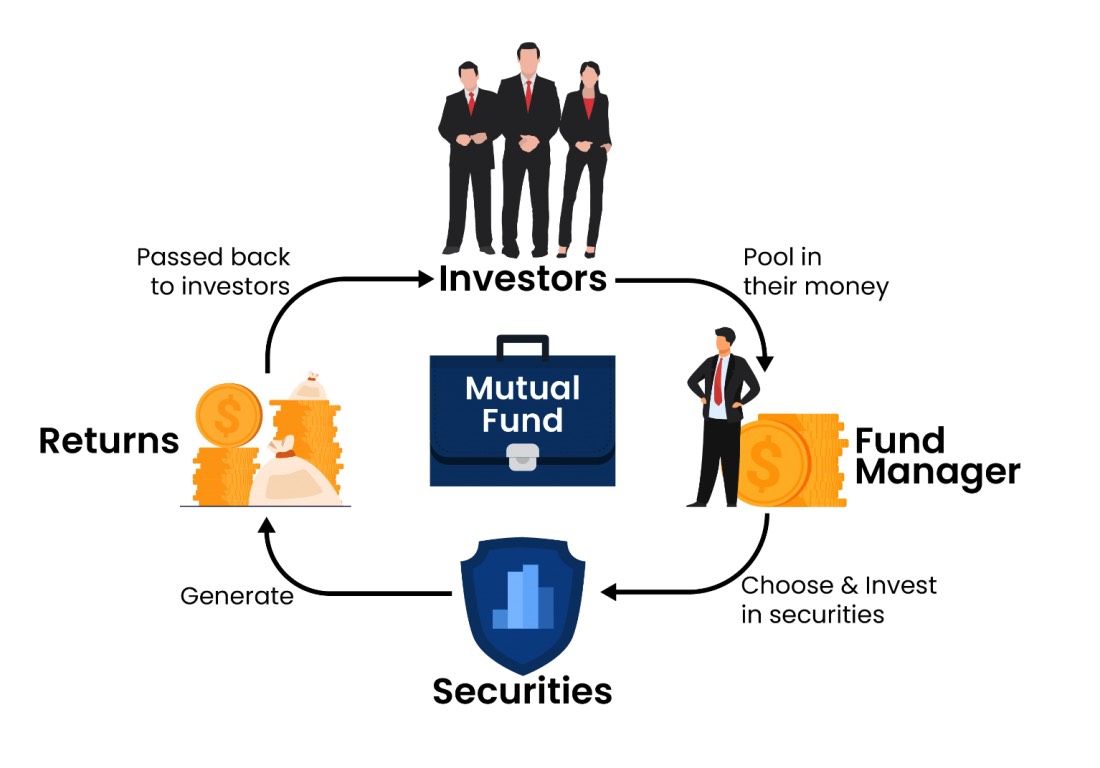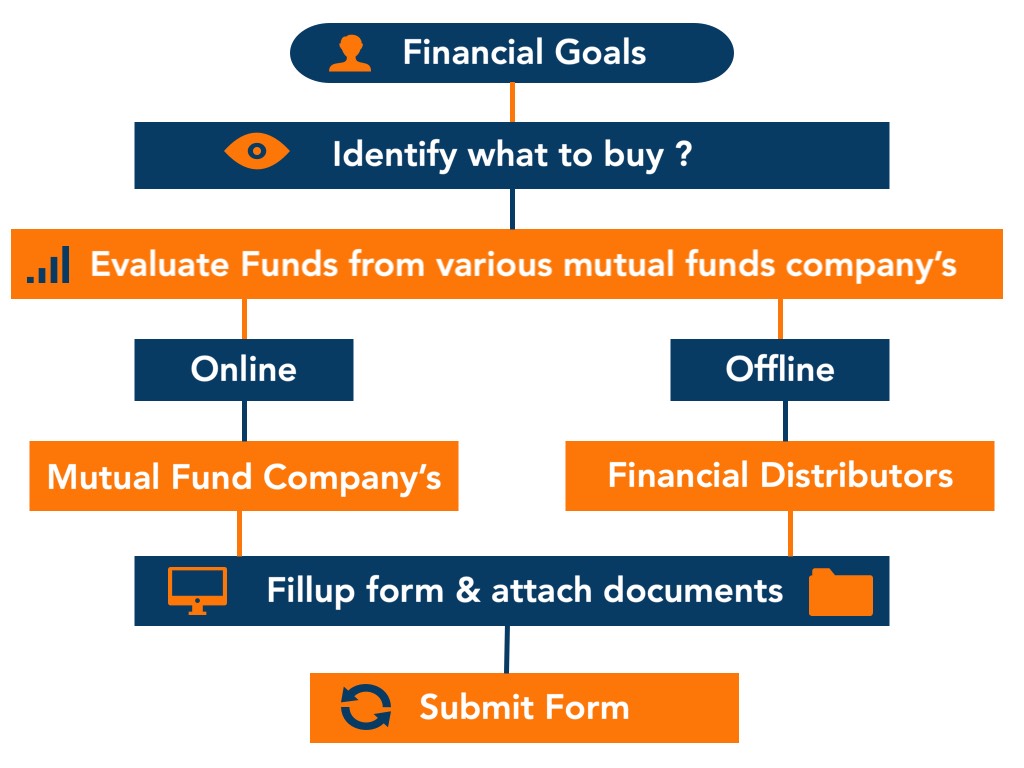Mutual funds are a popular investment option in India. Mutual funds are like baskets of investments managed by professionals. When you invest in a mutual fund, your money gets pooled with other investors and is used to buy a variety of stocks, bonds, or other assets. This diversification helps spread risk. Mutual funds offer an easy way for people to invest in the stock market or other assets without needing a lot of money or expertise. They are a popular choice for long-term savings and can help individuals achieve their financial goals, whether it's saving for retirement, education, or buying a home.
What is Mutual Fund ?
Simply put, the money pooled in by a large number of investors is what makes up a Mutual Fund. This money is then managed by a professional Fund Manager, who uses his investment management skills to invest it in various financial instruments.
Just like a share has a price, a mutual fund unit has an NAV. To put it simply, NAV represents the market value of each unit of a fund or the price at which investors can buy or sell units. The NAV is generally calculated on a daily basis, reflecting the combined market value of the shares, bonds and securities (as reduced by allowable expenses and charges) held by a fund on any particular day. Whether the scheme you want to invest in, has a NAV of 10 or 100 does not matter. If the fund delivers 10% returns in 1 year the NAV will go to 11 and 110, i.e both will deliver similar returns. So instead of concentrating on low NAV, check the consistency of performance of the fund.

1. What is NAV?
Just like a share has a price, a mutual fund unit has an NAV. To put it simply, NAV represents the market value of each unit of a fund or the price at which investors can buy or sell units. The NAV is generally calculated on a daily basis, reflecting the combined market value of the shares, bonds and securities (as reduced by allowable expenses and charges) held by a fund on any particular day.
Whether the scheme you want to invest in, has a NAV of 10 or 100 does not matter. If the fund delivers 10% returns in 1 year the NAV will go to 11 and 110, i.e both will deliver similar returns. So instead of concentrating on low NAV, check the consistency of performance of the fund.
2. What are different types of Mutual Funds?
Are you looking to invest for a short period of time or for long term? To be able to choose a fund that perfectly caters to your needs; you need to be aware of the various kinds of funds that are available.
A. Debt Mutual Funds:
Debt Mutual Fund works on borrowing.
So what are the conditions that are usually laid down when one borrows?
Reasonable assurance that the principal investment will be returned.
The interest that will be generated based on the rate of interest (also known as the coupon rate).
Tenure or the time over which the principal will be returned.
Debt Funds help bring stability to your investment portfolio since they are lower in risk as compared to Equity Funds and their aim is to generate steady returns while preserving your capital.
B. Equity Mutual Funds:
Debt Mutual Fund works on borrowing.
When you invest in equity, you are considered as an owner of that company,to the extent of your investment. So naturally, like any owner, your profit is linked with the performance of the company. The higher the profits of the company,the better is the share price and hence the better your gains.
Equity Funds with higher risk carry the potential to deliver high returns. And to help counter this risk, Mutual Funds are invested in multiple companies that usually don’t belong to one or correlated sectors. This is known as diversifying, which reduces risk.
C. Liquid Mutual Funds:
Debt Mutual Fund works on borrowing.
In financial terms, the word Liquid simply means “How fast can I get my invested money back?” A highly liquid asset is as good as hard cash. Liquid Mutual Funds have the least risk factor and may give you returns that are slightly higher than a savings account. These funds invest in faster maturing debt securities, therefore making them less risky.
D. Hybrid Funds:
Debt Mutual Fund works on borrowing.
As the name suggests, Hybrid Funds are those which have a combination of asset classes such as debt and equity in their portfolio. That is, they invest in a blend of debt, money market instruments and equity.
3. What are the advantages of Mutual Funds?
I. Mutual Funds are flexible
Most people have differing patterns of earning and spending,which is why investments need to be flexible so as to allow you to invest as per your situation. There are various characteristics of mutual funds which make them flexible,i.e.minimum investment amount, types of schemes, investment frequency and withdrawal option.
II. Mutual Funds are liquid
In open ended funds, where you can buy and sell on any business day, you can get your money back generally within 3 working days.
III. Mutual Funds are transparent and relatively safe
Naturally there is a feeling of uncertainty or cautiousness you feel,when you’re handing over your savings to somebody. In the case of Mutual Funds, your money is handed over to a professional, whose job is to keep track of markets and look out for the best opportunities for you. What’s more, Mutual Funds publish a monthly fact sheet which basically lists out all the important facts you need to know about the scheme you’ve invested in. In addition, the NAV is published on AMFI and on fund company websites on a daily basis, ensuring that you’re always in the loop about your investments.
IV. Mutual Funds help you diversify
Like the old saying, “Don’t keep all your eggs in one basket”, diversifying your investments will help you lower your risk. As you have previously read, Equity Mutual Funds invest in shares of various companies whereas Debt Funds invest in government securities, NCD,CDs,CPs bonds and other fixed income securities. Thus as an investor, you will be able to have a diversified investment basket.
V. Mutual Funds reduce the transaction cost
The power of bargaining lies in buying anything wholesale.The rate of buying in wholesale will obviously be much lesser compared to the retail rates. Now apply the same principal to Mutual Funds and what do you get? With many people pooling in their savings, you get the advantage of the power of bargaining which reduces the overall transaction cost.
VI. Professional Management
Do we cut our hair at home?The answer is an obvious “No”. We go to a barber who is an expert. Similarly in MutualFunds your money will be managed by a professional fund manager who will have experience in managing funds backed with sound research and understanding of trends.
4. How to invest in Mutual Funds in Investsphere Wealth ?
The answer to this question would depend upon your goals. First of all you should define your goals then depending upon the goals and the risk you want to take, identify and then evaluate the Mutual Funds.






